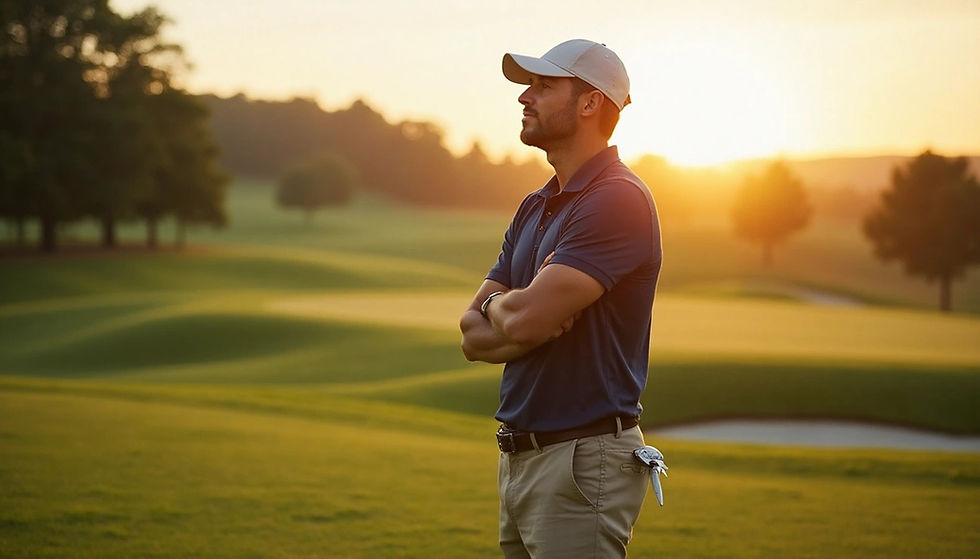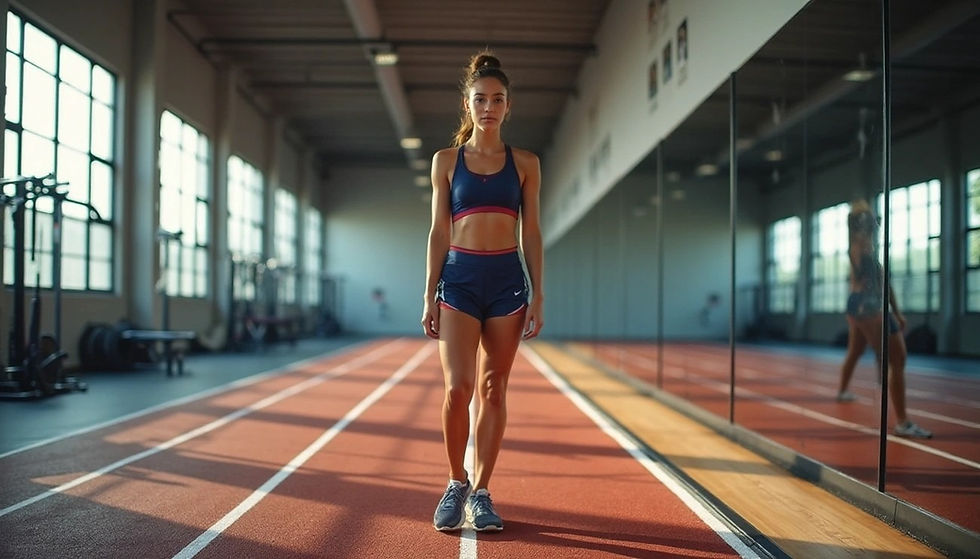How to Build Self Confidence in Sports: A Complete Guide for Athletes
- Dr Paul McCarthy

- Aug 7, 2025
- 6 min read
Are you an athlete struggling with belief in your abilities? You’re not alone. Building self confidence in sports is a critical factor that separates good athletes from great ones. Research shows that self confidence in sports directly correlates with improved performance outcomes, with studies revealing a positive correlation of 0.25 between confidence and athletic achievement.
This comprehensive guide will walk you through evidence-based strategies to develop unshakeable sports confidence, whether you’re a beginner or elite athlete. Let’s explore how you can transform your mindset and performance through proven psychological techniques.

Understanding Self Confidence in Sports
Self confidence in sports refers to an athlete’s belief in their ability to successfully perform sports-related tasks and achieve their goals. It’s not just a feeling—it’s a psychological state backed by science.
Recent meta-analyses examining 41 studies with 3,711 athletes have confirmed what many coaches intuitively know: athletes with higher confidence levels consistently outperform those with lower confidence. The relationship is even stronger when looking at pre-event self-efficacy, which shows a moderate positive correlation (r = 0.31) with performance outcomes.
What makes this relationship fascinating is how it varies across different contexts:
Individual sports show a stronger confidence-performance relationship (r = 0.29) compared to team sports (r = 0.14)
Closed-skill sports (like golf or diving) demonstrate a stronger correlation (r = 0.37) than open-skill sports (like basketball or soccer) (r = 0.23)
Elite athletes show the strongest connection between confidence and performance (r = 0.40)
These findings highlight why developing sports confidence isn’t just helpful—it’s essential for competitive success.
Assessing Your Current Confidence Level
Before implementing strategies to boost your confidence, it’s important to understand your starting point. Ask yourself these questions:
How do you feel before important competitions?
What happens to your performance when you face setbacks?
Do you believe you can succeed against higher-ranked opponents?
How do you talk to yourself during challenging moments?
Your answers reveal your current confidence patterns. Athletes with high sports confidence tend to perform better under pressure, while those with lower confidence often experience performance anxiety and negative self-talk.
Common confidence barriers include:
Past failures or traumatic sporting experiences
Perfectionism and unrealistic expectations
Comparison to other athletes
Fear of failure or success
Inconsistent performance
Identifying these barriers is the first step toward overcoming them. Remember that confidence in athletes is one of the strongest predictors of competitive success, making this assessment crucial to your development.

Evidence-Based Strategies to Build Self Confidence in Sports
1. Master the Mental Game Through Self-Talk
The field of self confidence sports psychology offers numerous evidence-based techniques for athletes, with self-talk being among the most powerful. Research shows that instructional self-talk proves more effective than motivational self-talk for specific skill enhancement.
How to implement effective self-talk:
Replace negative thoughts (“I might fail”) with specific, instructional statements (“Keep your eye on the ball”)
Develop personalized confidence-boosting mantras
Practice self-talk during training to make it automatic during competition
One athlete who famously used self-talk is Michael Phelps, who would repeat phrases like “I’m here to win” before races. This technique helped him become the most decorated Olympian of all time.
2. Visualization and Mental Rehearsal
Mental toughness is closely related to self-confidence and resilience in sports settings. One way to develop both is through visualization:
Find a quiet space and get comfortable
Visualize yourself performing successfully in great detail
Engage all senses—see, hear, and feel the performance
Include overcoming challenges in your visualization
Practice regularly, ideally before training sessions
Research indicates that mental toughness can be more important than physical ability in certain competitive situations. Athletes who regularly practice visualization report feeling more prepared and confident before competitions.
3. Goal-Setting Framework
Effective self confidence techniques for athletes include visualization, positive self-talk, and goal setting. When it comes to goals, follow this framework:
Process goals: Focus on actions within your control (e.g., practicing free throws for 30 minutes daily)
Performance goals: Target personal standards (e.g., improving free throw percentage to 80%)
Outcome goals: Aim for specific results (e.g., winning a championship)
The key is emphasizing process goals, as they build confidence through consistent achievement. Studies show that athletes who focus primarily on process goals maintain higher confidence levels even when facing setbacks.
4. Preparation and Skill Mastery
Building self confidence in sports requires consistent practice and mental preparation. Nothing builds confidence like knowing you’ve put in the work:
Implement deliberate practice focusing on specific skills
Create training situations that mimic competition pressure
Track improvements to provide concrete evidence of progress
Develop pre-performance routines that enhance focus
Many professional teams now employ specialists in self confidence sports psychology to help athletes develop these routines. The consistency of preparation creates a sense of control that directly enhances confidence.
Sport-Specific Confidence Considerations
Individual vs. Team Sports
The confidence-performance relationship varies significantly between individual and team sports:
Individual Sports
Self-reliance is crucial
Personal responsibility for outcomes is higher
Confidence must be self-generated
Examples: Tennis, golf, swimming
Team Sports
Collective confidence (team efficacy) matters
Confidence can be “borrowed” from teammates
Leadership influences team confidence
Examples: Basketball, soccer, volleyball
Coaches can help build confidence in athletes through structured goal-setting programs tailored to these differences. For individual sports, focus on personal achievement metrics; for team sports, emphasize both individual contributions and team success.
Skill Type Impact
Mental toughness and confidence requirements differ based on skill type:
Closed-skill Sports (predictable environment)
Routine and consistency are key
Perfectionism can be beneficial when managed properly
Focus on technical precision
Examples: Gymnastics, diving, archery
Open-skill Sports (unpredictable environment)
Adaptability and quick decision-making are essential
Confidence in improvisation matters
Focus on reading situations and responding
Examples: Football, hockey, basketball
Understanding these differences helps athletes develop sport-specific confidence strategies. The most successful self confidence techniques for athletes are those practiced consistently over time and tailored to their specific sport’s demands.
Maintaining Confidence Through Challenges
Dealing with Setbacks
Sports confidence can be rebuilt even after significant setbacks or injuries. The key is developing resilience:
View failures as learning opportunities
Analyze setbacks objectively without emotional judgment
Focus on aspects within your control
Reconnect with past successes
Set small, achievable goals to rebuild momentum
Maintaining confidence in athletes during losing streaks requires specialized psychological approaches. Research shows that athletes who can separate their self-worth from performance outcomes maintain higher confidence during difficult periods.
Managing Performance Pressure
When the stakes are high, confidence often wavers. Try these strategies:
Focus on the process rather than outcomes
Use pre-performance routines to center yourself
Implement relaxation techniques (deep breathing, progressive muscle relaxation)
Embrace pressure as a challenge rather than a threat
Athletes can develop mental toughness through specific psychological training exercises designed to simulate pressure. Studies show that athletes who regularly practice under pressure conditions perform better in actual high-pressure situations.
The Role of Support Systems
Coaches play a crucial role in developing self confidence in sports through positive reinforcement. Beyond coaches, consider:
Teammates who provide encouragement
Mental performance consultants
Family and friends who offer perspective
Role models who demonstrate resilience
Research indicates that athletes with strong support systems maintain more stable confidence levels throughout their careers.
Putting It All Together: Your Confidence-Building Plan
Developing sports confidence is a process that involves both mental and physical training. Here’s a structured approach:
Week 1-2: Assessment and awareness
Identify confidence patterns and barriers
Begin basic self-talk and visualization practice
Week 3-4: Skill development
Implement deliberate practice on areas needing improvement
Develop pre-performance routines
Week 5-6: Pressure training
Create practice situations that mimic competition
Refine mental skills under pressure
Week 7-8: Integration
Combine physical and mental training
Test strategies in low-stakes competitions
Ongoing: Refinement
Regularly assess confidence levels
Adjust strategies based on results
Coaches should incorporate self confidence techniques for athletes into regular training sessions for maximum effectiveness.
Conclusion
Self confidence in sports isn’t something you either have or don’t—it’s a skill that can be developed through consistent practice and evidence-based techniques. The research is clear: confidence directly impacts performance, with stronger effects in individual sports, closed-skill activities, and elite competition.
By implementing the strategies outlined in this guide—from self-talk and visualization to goal-setting and deliberate practice—you can build the unshakeable confidence needed for athletic success. Remember that confidence building is not a one-time event but an ongoing process requiring patience and persistence.
Whether you’re a weekend warrior or Olympic hopeful, investing in your mental game through these proven approaches will yield dividends not just in your athletic performance, but in your approach to challenges throughout life.
What confidence-building technique will you implement first? The journey to greater self confidence in sports begins with a single step—take it today.







